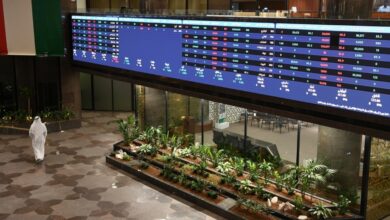
The start of Trump’s second term has sent ripples through financial markets, fueling uncertainty and triggering a downturn in U.S. stocks. Investor anxiety is reflected in the sharp 30% surge of the VIX, often referred to as Wall Street’s fear gauge, as markets brace for potential policy shifts and economic turbulence.
A recent report warns that Gulf investors, heavily exposed to U.S. assets, face significant macroeconomic risks as the U.S. economy teeters on the edge of stagflation and a potential dollar depreciation.
According to the EGBI report, shifting to Asian stocks could offer Gulf investors much-needed diversification and protection against potential losses. The biggest risks they face from a second Trump administration stem from his aggressive “drill, baby, drill” energy policy, which could ramp up fossil fuel and shale oil production, and his resistance to a peace deal with Putin on Ukraine, which might otherwise lead to eased sanctions on Russia.
The report highlighted that this downward trend in Brent crude prices—from $82 per barrel in mid-January to $72 per barrel currently—has significant implications for Gulf economies. This 12% drop over six weeks poses challenges for the region’s fiscal stability, as their budget break-even prices are typically $20 to $35 higher than the current Brent price, making deficits more likely.
As a result, Gulf stock valuations could face significant pressure, especially if Brent crude drops to $60 per barrel—or even below $50—due to a potential surge in Russian oil and gas supply once sanctions are lifted. This influx could disrupt global markets, further challenging the region’s economic stability.
The dollar has also declined by 3% from its index peak, driven by a drop in U.S. Treasury yields from 4.8% on January 13 to 4.22%. This coincides with a slowdown in U.S. economic growth, which fell to just 1% in the first quarter, adding to market uncertainty.
Inflation Rates
The report highlighted a sharp decline in U.S. consumer confidence by about 7 points last month, alongside a rise in inflation to over 3% in the Treasury inflation-protected securities market. It emphasized that there is no monetary justification for the Federal Reserve, under Powell, to cut interest rates in December’s FOMC meeting or even in 2025, given that inflation remains well above the central bank’s 2% target.
Elon Musk, along with his Department of Government Efficiency, has set the stage for unemployment to surpass 4% this spring and summer, as sweeping agency shutdowns, such as the abrupt closure of USAID, lead to mass layoffs of tens of thousands of federal workers.
Meanwhile, the Department of Government Efficiency’s proposed $1 trillion in spending cuts is wreaking havoc on consumer and business confidence, straining local economies, and squeezing state budgets. This sets up a major clash between the Fed, led by Powell, and the Trump White House, which is expected to ramp up pressure on the Federal Open Market Committee to slash interest rates.
The report emphasized that with the U.S. economy stuck in stagflation and tensions rising between the ostensibly independent Federal Reserve and President Trump, the reign of the dollar as the dominant global currency could be at risk.
Wealth Protection
The report highlighted that Gulf investors, heavily reliant on the dollar, should safeguard their wealth by diversifying into non-dollar assets. Emerging Asia presents the most attractive opportunity for GCC investors looking to mitigate risks associated with the dollar, fluctuating oil prices, geopolitical tensions, and the uncertainties of Trump’s second term.
The report noted that for the past 12 years, the Bank of Japan has kept interest rates near zero, even as the yen weakened significantly. However, with rising inflation and wages, the central bank is now compelled to hike rates to strengthen the yen against the dollar. This shift makes a repeat of last August’s carry trade collapse and global stock market squeeze almost certain, only this time, on a much larger scale.
Credit Crunch and Recession
The report highlighted that Wall Street investors are aware that Japanese institutions may need to offload nearly a trillion dollars in global bonds and stocks to stabilize their domestic bond market.
This shift could drive the yen up to 120 per dollar, trigger declines in Western treasuries and stock markets, and burst real estate bubbles in dollar-linked economies.
Gulf investors, the report warned, must hedge against these risks, as the fallout could lead to a credit crunch and recession. With Gulf currencies unable to be devalued, the burden on regional stock and real estate markets may intensify, especially amid ongoing concerns over oil prices.
Source: Al Qabas













